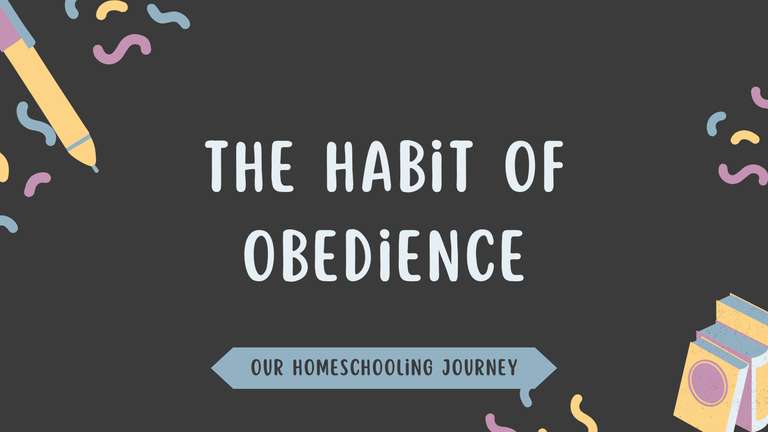
Whenever someone new learns that I homeschool my kid, one of the questions I am often asked is "How do you make your child listen and obey your instructions during your lessons?" There's sometimes a follow up question asking how my relationship with my daughter is. I've been hearing about stories where mother and child ended up scarring their relationship with each other during the time when children were not able to go to school and parents did not have any choice but to assist their children in their learning.
Anyway, going back to the question, how do I make my child obey? It's funny because the term how do I make her do this or that. It's as if she's a chess piece that I move from one square to another and make her do thins I want done.
Obedience is a habit that needs to be developed early on in a child. But it comes hand in hand with the habit of attention. The child can't obey you if they can't understand the instruction. And most of the time, the child can comprehend what grown ups say if only they were able to pay attention. I have written about some techniques on how to instill the habit of attention before. The most effective way of developing attention is to not repeat the reading/lesson and then have them narrate everything they understood about the topic. Whenever my kid says "Nanay, what was that again? What happened, I zoned out." The initial reaction would be to scold the child and then repeat the reading. I used to do that. Now, I take a moment to hold my anger back and then tell her gently that there are no repeats and since she did not pay attention, she's going to miss out that part.
Now, once you have the habit of attention nailed, you may now move on to instilling the habit of obedience which is not as easy as it looks. There are so many things that you'll need to do but once you are able to practice it, there will be better days ahead, I assure you.
First, the instructions need to be clear, simple, and doable. Especially when it comes to children. They need to have full understanding of the task at hand. They need to do what it is you need them to do, how it should be done, when it needs to be done, and if they ask (sometimes even if they don't) they need to also know the why's.
My daughter finds it easier to follow instructions when she understands the logic behind it. She would ask why we need to always fix the bed when we get up in the morning, or a certain thing need to be done this way or that way. She would also ask if she can try another way, to which I am there to let her try her own way. If it works, then we're good. If it doesn't, then she is free to try any other way until she figures out which way is best.
When I first taught her how to wash dishes, I gave her clear and concise instructions. It has actually become one of our bonding time. We would talk to each other while we are washing dishes. I find children are very receptive to instructions when they are comfortable and are not afraid to make mistakes. When they do make mistakes, children don't need to hear "Hey, you did it wrong! Do better next time." They need to know what they did wrong and what they can do to make sure they don't make the same mistake again.
Accountability also comes with obedience. When I give an instruction, I expect her to obey. So when I tell her you need to make sure that all of your school related tasks are done before 5PM, I am literally expecting that she should be done by then. I set a clear timeline to which she is expected to comply to.
What will happen when she does not obey? There are consequences. Not punishments but consequences. A good example is if she does not eat her vegetables during lunch, then she will have to finish them during her merienda time. That would mean she don't get to eat the banana que or ice cream or any other snacks we bought that day because she will have to finish the vegetables she refused to eat during lunch time. Another is when she spends too much time playing and forgets about her assignments. We take away some of her playing time for the week and she will spend those times completing the things she did not. It may sound like a punishment (you did not do your assignment, therefore you are not allowed to play) but we make sure that we word it in a way that she understands it is not the playtime we are taking away, we are just offsetting the time she needed to do responsible things.
I don't get angry as often as I used to before. Instead of using my energy for anger, I use it to creatively think of direct consequences for any of her disobedience. I'm raising a kid to be an independent adult. When we grow up, our parents won't always be there to give us punishments. But there will always be consequences to all our bad choices. I am instilling in her that she has freedom to do as she pleases but there are always consequences to all her actions.
So I don't shout at her anymore. If I do (sometimes I still do, I'm still human) I make sure that I apologize once we have all cooled down. Now, when she is given instructions, she first asks questions just so she understands what is being asked of her. If it makes sense to her, she does as she is instructed. She might give suggestions until we come to an agreement.
So how do I make my daughter listen and obey? Instructions need to be clear, understandable, and doable. Obedience is expected and there are consequences (not punishment) for disobedience. And she is allowed to question the instruction because we do not want to raise blindly obedient adults.




Hmm
This means that you must have impacted the habit of obedience in her at an early stage of her life. That’s good one and shows that every child can be obedient as long as you teach them the act of obedience when they are still very little
Yes, that's right. It did not happen overnight. It took a lot of patience, consistency and grace to reach this point. Even now, we still have stumble every now and then. But we just get back at it right away. I am looking forward to happy and easy days once good habits have been formed.
Most children of nowadays lacks that, but I'm glad with your help they will be able to have the knowledge of obedient
The habit of obedience is so important to instill in our children! Great job!
Yes. It's a very integral part of life. Analytical and obedient children become thinking and law abiding citizens in the future.